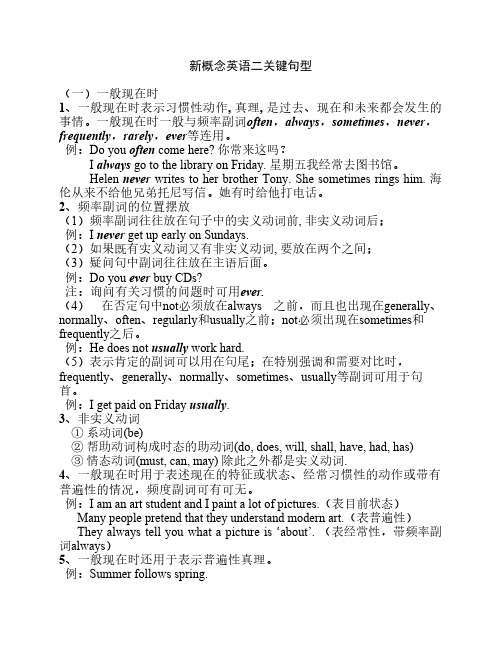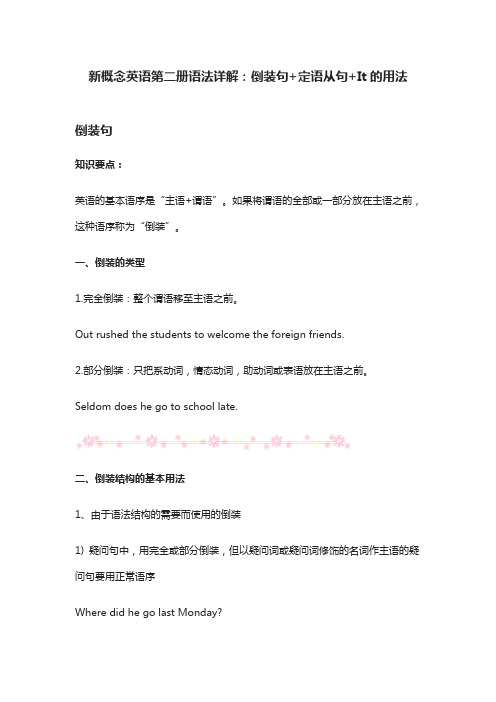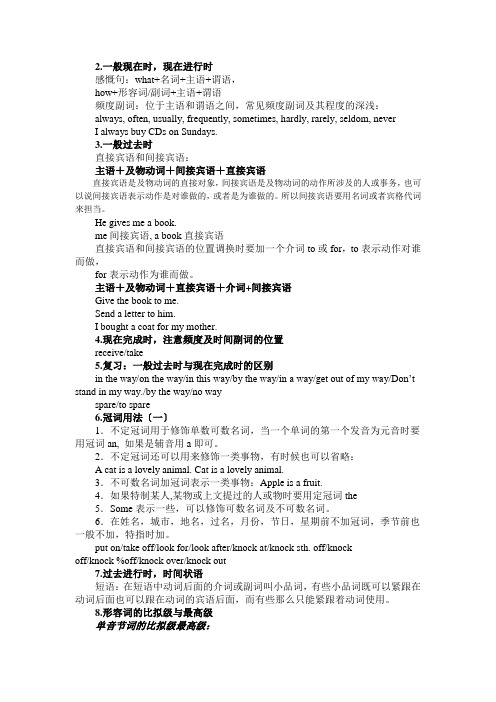新概念第二册经典句型解析1
新概念英语二关键句型

新概念英语二关键句型(一)一般现在时1、一般现在时表示习惯性动作, 真理, 是过去、现在和未来都会发生的事情。
一般现在时一般与频率副词often,always,sometimes,never,frequently,rarely,ever等连用。
例:Do you often come here? 你常来这吗?I always go to the library on Friday. 星期五我经常去图书馆。
Helen never writes to her brother Tony. She sometimes rings him. 海伦从来不给他兄弟托尼写信。
她有时给他打电话。
2、频率副词的位置摆放(1)频率副词往往放在句子中的实义动词前, 非实义动词后;例:I never get up early on Sundays.(2)如果既有实义动词又有非实义动词, 要放在两个之间;(3)疑问句中副词往往放在主语后面。
例:Do you ever buy CDs?注:询问有关习惯的问题时可用ever.(4)在否定句中not必须放在always 之前,而且也出现在generally、normally、often、regularly和usually之前;not必须出现在sometimes和frequently之后。
例:He does not usually work hard.(5)表示肯定的副词可以用在句尾;在特别强调和需要对比时,frequently、generally、normally、sometimes、usually等副词可用于句首。
例:I get paid on Friday usually.3、非实义动词①系动词(be)②帮助动词构成时态的助动词(do, does, will, shall, have, had, has)③情态动词(must, can, may) 除此之外都是实义动词.4、一般现在时用于表述现在的特征或状态、经常习惯性的动作或带有普遍性的情况,频度副词可有可无。
新概念二册经典句型解析

1、“However, this does not always happen。
”这样的事情并不是总会发生。
这句子乍一瞅,觉得蛮简单的,没有任何的技术含量。
错!这是一句非常地道和常用的英语表达句式!我们中国人在练习口语时很多人会有一种理解上的误区:句子越复杂,感觉越酷。
这是不对的!什么是流利的口语?是说出艰涩的句子和选择生僻的单词吗?不,流利的口语是在合适的时间合适的场合思维敏捷地说出合适的话,口语句子是简单而到位的。
比如上面的这句话就适合很多的场景。
笔者曾经经历过这样一个片断:在一次朋友的birthday party上,有很多男女以“对”的形式前来参加舞会,其中有位男生,竭尽全力地在好友面前炫耀自己在女友面前是多么的男子气概!说着,就冲着正和别人说话的girlfriend怒道:Come here, quickly! There are some my own friends!情况发生了:女朋友没有理会他!接着,那位男生连忙打圆场,可女友坚定地保持自己的风格:就是不搭理他(因为:她知道男友的坏毛病)。
没法子,那个男孩子激动地向他周围的朋友说道:Listen, this does not always happen. She is always busy! 通过这样的一个看似简单的句子,化解了一场尴尬的场景!再举一例:当你和朋友唱k的时候,一下子唱跑了,这时的你若能用到这样的句子,岂不是又挽回了一些面子。
大家有学会吗?什么时候可以把这个句子用出去?当你要想别人讲述一件天大的好事时,同样也可以用这句话来卖卖关子。
如老板宣布给员工加薪之前:This does not always happen, but we decide to give you two extra pounds a month!所以,在遇到尴尬的情况或想卖关子的时候,请记住:This does not always happen.2. “Nearly a week passed before the girl was able to explain what had happened to her.”(P154页,第33课,第1行)几乎过了一个星期,那姑娘才能讲述自己的遭遇。
(全)新概念英语第二册语法详解:倒装句+定语从句+It的用法

新概念英语第二册语法详解:倒装句+定语从句+It的用法倒装句知识要点:英语的基本语序是“主语+谓语”。
如果将谓语的全部或一部分放在主语之前,这种语序称为“倒装”。
一、倒装的类型1.完全倒装:整个谓语移至主语之前。
Out rushed the students to welcome the foreign friends.2.部分倒装:只把系动词,情态动词,助动词或表语放在主语之前。
Seldom does he go to school late.二、倒装结构的基本用法1、由于语法结构的需要而使用的倒装1) 疑问句中,用完全或部分倒装,但以疑问词或疑问词修饰的名词作主语的疑问句要用正常语序Where did he go last Monday?Are you listening to the radio?2) “there be”结构中,There are three wells in our village.There stands a big paper making factory by the river.3) 在以here, there, now, then, in, away, up down等副词开头的句子中,使用完全倒装结构。
但如果主语是代词则用正常语序。
There goes the bell.Now comes your turn to playDown she went.4) 在以neither nor 或no more开头的句子中,表示“……也不这样”,neither 和nor意思相同,可以替换使用;no more表示动作的程度并不比前面提到的稍强,意为“也不……”。
I can’t swim, nor (neither) can she .He hasn’t been to the countryside, neither does he want to go there. He did not turn up. No more did his wife.5) 用在as(尽管)引导的让步状语从句中,从属连句as用于特殊语序,含义与though, although相同,但“as”这种结构可表示非常强烈的对照,必须用倒装(表语提前)。
新概念英语第2册:lesson 1- lesson 12核心句型精讲

• 拓展提高:
【Unit 01 My classroom】
• how还可以接整句话表示感叹。
e.g. How I miss my old school!我真想念我的母校!
e.g. How I hate them! 我恨透了他们!
• 及时操练
答案
你真好!
How good you are!/What a good person you are!
【FUronmitt0he1re,Mheywcillal sflsyrotooPmer】th. 从那里, 他再飞往珀斯。
(经典原文:NCE2-L4) (He will soon visit Darwin. From there, he will fly to Perth.)
小贴示: 尽量用简洁的英语来表达意思。语言学中,简洁就 是美。(Brevity is beauty.) 复杂版本:He will go to Perth by plane.
(经典原文:NCE2-L8) 句型解析: 比较级 句子主干(含形容词或副词的比较级)+than + 比较对象 在形容词或副词比较级前面可以加上以下的词来具体修饰程度: far,much,a little, a bit,even等。
• 小贴士
【Unit 01 My classroom】
• 拓展提高
【Unit 01 My classroom】
匆匆忙忙去某地,可以将go to ...in a hurry
简化为:hurry to...
• 及时操练 就在那时,一名男子匆匆忙忙来到售票处。 Just then, a man hurried to the ticket office.
Pinhurst is only five【mUilnesitfr0o1m SMilbyucryla, sbsurt oMor.mS】cott cannot get a telephone for his new garage, so he has just bought twelve pigeons. 平赫特离锡尔伯里只有 5 英里, 但詹姆斯.斯科特先生未能为他新 的汽车修理部搞到一部电话机, 所以他买了只 鸽子.
新概念第二册课后答案详解Lesson1~3

新概念第二册课后答案详解Lesson1~3新概念第二册课后答案详解Lesson11 关键句型练习A I (1) got (2) very angry (3) . I (1) could nothear (2) the actors (3) . I (1) turned round (2) .I (1) looked at (2) the man and the woman (3) angrily (4) .They (1) did not pay (2) any attention (3) . In the end (6), I (1) could not bear (2) it (3). I (1) turned round (2) again (6) . zI (1) can 't hear (2) a word (3)! I(1) said (2) angrily (4) .zIt (1) is (2) none of your business (3) , the young man (1) said (2) rudely (4) . zThis (1) is (2) a private conversation (3)!B 1 I enjoyed the film yesterday.2 I listened to the news carefully.3 The man played the piano well.4 The children played games quietly in their room yesterday.5 He opened the door quietly.6 He left immediately.7 He planted a tree in the corner of the garden.8 He read the letter quickly in his office before lunch.9 I borrowed a book from the library this morning.10 The cook spoilt the soup.11 We stay at home on Sundays.12 There are a lot of people at the bus stop.13 The little boy ate greedily an apple in the kitchen this morning.14 She draws beautifully.15 I like music very much.16 They built a new school in our village last year.17 The match ended at four o ' clock.18 She received a letter from her brother last week.2、选择题1. b选 b 最为正确。
新概念英语第二册语法详解和总结

2.一般现在时,现在进行时感慨句:what+名词+主语+谓语,how+形容词/副词+主语+谓语频度副词:位于主语和谓语之间,常见频度副词及其程度的深浅:always, often, usually, frequently, sometimes, hardly, rarely, seldom, neverI always buy CDs on Sundays.3.一般过去时直接宾语和间接宾语:主语+及物动词+间接宾语+直接宾语直接宾语是及物动词的直接对象,间接宾语是及物动词的动作所涉及的人或事务,也可以说间接宾语表示动作是对谁做的,或者是为谁做的。
所以间接宾语要用名词或者宾格代词来担当。
He gives me a book.me间接宾语, a book直接宾语直接宾语和间接宾语的位置调换时要加一个介词to或for,to表示动作对谁而做,for表示动作为谁而做。
主语+及物动词+直接宾语+介词+间接宾语Give the book to me.Send a letter to him.I bought a coat for my mother.4.现在完成时,注意频度及时间副词的位置receive/take5.复习:一般过去时与现在完成时的区别in the way/on the way/in this way/by the way/in a way/get out of my way/Don’t stand in my way./by the way/no wayspare/to spare6.冠词用法〔一〕1.不定冠词用于修饰单数可数名词,当一个单词的第一个发音为元音时要用冠词an, 如果是辅音用a即可。
2.不定冠词还可以用来修饰一类事物,有时候也可以省略:A cat is a lovely animal. Cat is a lovely animal.3.不可数名词加冠词表示一类事物:Apple is a fruit.4.如果特制某人,某物或上文提过的人或物时要用定冠词the5.Some表示一些,可以修饰可数名词及不可数名词。
新概念英语第二册“五种基本句型”的语法讲解
新概念英语第二册“五种基本句型”的语法讲解新概念英语第二册“五种基本句型”的语法讲解1.主+谓(不及物动词)e.g. Man can think.The fire is burning.常用不及物动词有break, breathe, burn, smoke, swim, skate, appear, disappear, work, think etc.2.主+谓+表语(系动词)e.g. He became a scientist.She is getting more and more beautiful.常用系动词:be, get, turn, feel, seem, appear, look, taste, sound, smell, become, go, prove etc.3.主+谓+宾(及物动词)e.g. We love peace.They will paint the door.常用动词有:see, watch, need, love, like, study, answer, carry, etc.4.主+谓+宾+宾补e.g. We elected him president.They painted the door white.I advised the students to recite the texts.王牌重点:常用作宾补的`形式(1)名词:The couple named their baby Johnson.(2)形容词:I keep the door open.(3)副词:The naughty boy knocked the bottle over.(4)不定式:He ordered his men to fire.(5)分词:He heard me singing.I saw the vase broken.(6)介词短语:They look on him as a teacher.(7)名词性从句:I asked him what he was doing.5.(1)主+谓+间接宾语+直接宾语My friend bought me a gift.I passed him the book.(2)主+谓+直宾+介词+间宾My friend bought a gift for me.I passed the book to him.忘记就意味着背叛→常与介词 for 搭配的动词有:buy, make, do, get, play, call, choose, cook, fetch, find, keep, order, save, etc.常与介词 to 搭配的动词有:bring, give, grant, hand, pass, lend, offer, pay, promise, sell, send, show, each, tell, throw, write, etc.。
新概念英语第2册Lesson1~3重点语法句型
【导语】新概念英语⽂章短⼩精悍,语句幽默诙谐,语法全⾯系统。
适合各个阶层的⼈群学习参考。
相信有了新概念英语,你也可以成为“⼤神”级别的⼈物!还在等什么?快来加⼊学习吧!⼩编与您⼀起学习进步!新概念英语第2册Lesson1重点语法句型 ⼀、重要句型或语法 1、简单句及其语序 1)句⼦种类:侧重按句⼦结构分为简单句、并列句、复合句 2)句⼦成分:主语、谓语、宾语、定语、状语、补语、表语 3)简单句的基本成分和语序:参考教材第14页的表格和练习 ⼆、课⽂主要语⾔点 Last week I went to the theatre. 可介绍英语句⼦尾重的原则及其运⽤。
注意theatre(剧院)与cinema(电影影)的区别。
I had a very good seat. have a good seat,座位很好。
可简单复习第⼀册⾥学过的have的⽤法。
The play was very interesting. 对⽐interesting和interested,引出使役动词的⽤法:-ed结尾强调“某⼈感到...”,-ing结尾强调“令⼈...”。
I did not enjoy it. 侧重讲enjoy doing的⽤法,提醒后⾯会学习动名词的⽤法。
They were talking loudly. 可以结合第⼀册第73课,复习“形容词+ly”构成副词的构词法。
⽂中类似的⽤法还有angrily何rudely。
I got very angry. 此处可以跟学⽣分析此处的动词如果⽤was,与⽤got,有何差异。
get是变化系动词,更能表达出作者情绪的变化过程,⽽be只是⼀个状态系动词,⽆法体现过程。
I could not hear the actors. 提⽰actor的构词法,引出actress。
也可以做拓展,引出waiter和waitress等。
I turned round. turn round也可以⽤turn around。
新概念第二册L11知识要点总结
新概念第二册L 11复习资料一.L11词汇讲解:1.turn 行为,举止a good turn 一种好的行为turn left 向左转/turn right 向右转/turn around 转圈turn on the radio 打开收音机/turn off the TV 关掉电视机In autumn,leaves of the trees turn yellow. 秋天树叶变黄。
2.deserve 应得到,值得You deserve a good husband.你值得拥有一个好丈夫。
You deserve to have our respect.你应该得到我们的尊重。
wyer 律师lawyer’s office 律师事务所law 法律4.bank 银行I’m now at the bank.我现在在银行。
其他意思:河岸Some children are sitting on the banks of the river.一些孩子们坐在岸边。
5.salary 工资salary用来指稳定的薪资wages 用来指不稳定的薪资复数形式:salaries6.immediately 立刻同义短语:at once/right now/right away二.重点语法:1.when,while,as引导的状语从句两件过去同时发生的事情可以用when,while,as 来连接,发生时间较长的事情用过去进行时,较短的事情用一般过去时。
As the royal visitors were passing, the people cheered.当皇家参观者人经过的时候,人群欢呼起来。
While he was writing on the blackboard, the children were talking.当他在黑板上写的时候,孩子们在说话。
2.v.+sb. to do sth.ask sb. to do sth.要求某人做某事want sb. to do sth.想要某人做某事help sb. to do sth. 帮助某人做某事teach sb. to do sth. 教某人做某事advise sb. to do sth. 建议某人做某事allow sb. to do sth.允许某人做某事order sb. to do sth.命令某人做某事prefer sb. to do sth.宁愿某人做某事wish sb. to do sth.希望某人做某事三.重点短语:1.borrow sth. from sb.向某人借某物He has never borrowed money from me.他从来没跟我借过钱。
新概念英语第二册重点语法句型
新概念英语第二册重点语法句型新概念英语第二册是初学者学习英语的重要教材,其中的语法和句型是非常重要的。
以下是重点语法句型及其解析。
1. 动词的不定式英语中的不定式是以to开头的动词形式,常常用来表示目的、意图、结果等。
例如:- I want to learn English.(我想学英语。
)- He went to the store to buy some food.(他去商店买了一些食物。
)- She studies hard to pass the exam.(她努力学习以通过考试。
)2. 现在完成时现在完成时是表示过去发生过的动作与当前的关联。
通常是用have/has+过去分词构成,例如:- I have eaten breakfast.(我吃了早餐。
)- They have been to London many times.(他们去过很多次伦敦。
)- Have you ever tried sushi?(你试过寿司吗?)3. 过去完成时过去完成时是表示过去动作在另一个过去时间点之前完成。
常常是用had+过去分词构成。
例如:- They had finished their homework before I arrived.(我到达之前他们已经完成了作业。
)- The movie had already started when we got there.(当我们到达那里时,电影已经开始了。
)4. 被动语态被动语态是指动作的承受者比较重要,而动作的执行者不那么重要。
被动语态的构成是be+过去分词。
例如:- The cake was made by my grandma.(蛋糕是我奶奶做的。
)- The letter will be sent tomorrow.(信件明天会被寄出。
)- The thief was caught by the police.(小偷被警察抓住了。
)5. 虚拟语气虚拟语气是表示假设的语气,常常用在宾语从句、条件从句和表达愿望的句子中。
- 1、下载文档前请自行甄别文档内容的完整性,平台不提供额外的编辑、内容补充、找答案等附加服务。
- 2、"仅部分预览"的文档,不可在线预览部分如存在完整性等问题,可反馈申请退款(可完整预览的文档不适用该条件!)。
- 3、如文档侵犯您的权益,请联系客服反馈,我们会尽快为您处理(人工客服工作时间:9:00-18:30)。
新概念第二册经典句型解析1
###新概念频道为大家整理的新概念第二册经典句型解析1,供大家参考。
更多阅读请查看本站频道。
1“However, this does not always happen。
”
这样的事情并不是总会发生。
这句子乍一瞅,觉得蛮简单的,没有任何的技术含量。
错!这是
一句非常地道和常用的英语表达句式!我们中国人在练习口语时很多
人会有一种理解上的误区:句子越复杂,感觉越酷。
这是不对的!什
么是流利的口语?是说出艰涩的句子和选择生僻的单词吗?不,流利
的口语是在合适的时间合适的场合思维敏捷地说出合适的话,口语句
子是简单而到位的。
比如上面的这句话就适合很多的场景。
作者以前经历过这样一个
片断:在一次朋友的birthday party上,有很多男女以“对”的形式
前来参加舞会,其中有位男生,竭尽全力地在好友面前炫耀自己在女
友面前是多么的男子气概!说着,就冲着正和别人说话的girlfriend
怒道:Come here, quickly! There are some my own friends!情况
发生了:女朋友没有理会他!接着,那位男生连忙打圆场,可女友坚
定地保持自己的风格:就是不搭理他(因为:她知道男友的坏毛病)。
没法子,那个男孩子激动地向他周围的朋友说道:Listen, this does not always happen. She is always busy! 通过这样的一个看似简单
的句子,化解了一场尴尬的场景!再举一例:当你和朋友唱k的时候,一下子唱跑了,这时的你若能用到这样的句子,岂不是又挽回了一些
面子。
大家有学会吗?什么时候能够把这个句子用出去?当你要想别人
讲述一件天大的好事时,同样也能够用这句话来卖卖关子。
如老板宣
布给员工加薪之前:This does not always happen, but we decide
to give you two extra pounds a month!
所以,在遇到尴尬的情况或想卖关子的时候,请记住:This does not always happen.
2. “Nearly a week passed before the girl was able to explain what had happened to her.” (P154页,第33课,第1行)
几乎过了一个星期,那姑娘才能讲述自己的遭遇。
句型提炼:一段时间passes + before…
这个句型的过人之处就在于英语思维的完美转换,通常人们的习惯思维表达“过了(一段时间)才(发生某事)”,很多人的头脑中的第一反应是用“after+时间,......”。
请大家看这个句型字面翻译是:“在(发生某事)之前,(一段时间)过去了”,也就是通常理解的“过了(一段时间)才(发生某事)”。
这才是较为地道的用法!
这个句型为你提供了另一种有些特别的表达方式。
Some hours passed before the heavy rain stopped.
几个小时过后,这场大雨停止了。
A week passed before I received a formal letter from the company.
一个星期之后,我收到了这家公司的一封郑重其事的来信。
Many years passes before he grows up to be a top astronaut.
多年过后,他成为了一名的宇航员。
3. “The one with the money got such a fright that he dropped the bag.”(P162页,第35课,第6行)
拿钱的那个窃贼吓得把提包都仍掉了。
句型提炼:such /so…that+结果状语从句
such…that…或so…that…引导结果状语从句,意思是“如此……以至于……”。
这个句型是我们不能再熟悉的句型了!在我们
中学的时光中,这个句型就是我们考试中的必点菜!但是又有多少人
还在雾里看花,两者的区别是:such后面接名词(名词前能够有形容词修饰这个名词),so后面接形容词或副词。
He is such a peculiar person that I have never been able to figure him out.
他是如此地古怪,我一直都没能有办法琢磨透他。
The dress is so tight that I feel uncomfortable.
这条裙子太紧了,我觉得很不合身。
The boss had such a bad temper that everyone feared him.
老板的脾气很大,以至于所有的人都很怕他。
Ok,我们基本掌握了它们的技巧,现在让我们在尝试着用这两个句型去表达同样的意思:
她是如此漂亮的女孩子,人人都喜欢她。
She is such a pretty girl that everyone likes her.
She is so pretty that everyone likes her.
请大家充分地发挥它们的潜能吧!
4. “In the end, it was more than he could bear.”(P174页.第38课,第8行)
最后,他再也受不了了。
句型提炼:It is more than+比较状语从句
这句话的于众不同在于:用肯定的形式去表达否定的意思。
